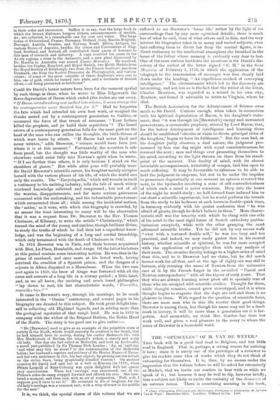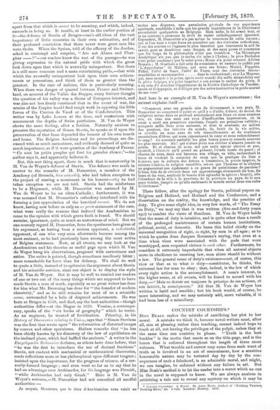THE " OPUSCULES " OF M. VAN DE WEYER.* Tuts
book will be a good deal read in Belgium, and but little read in England. That is, perhaps, a strong reason for noticing it here; since it is surely one of the privileges of a reviewer to give his readers some idea of works which they do not think of exhausting for themselves. It is, then, by no means under the impression that the volume before us will be asked for extensively at Mudie's, that we invite our readers to bear with us while we speak of it ; but because it may be well to dip, however briefly, into a subject not likely to excite the curiosity of the daceuvres of an autumn recess. There is something amusing in the book,
• Cho ix d'Opeucedes, Philosophivtes, Poliiiques, el Lifieraires, de &leder& ran de Weyer. Deuxieme SErie. Londres: Trbbner et Cie. lea. apart from that which is meant to be amusing, and which, indeed, succeeds in being so. It recalls, at least in the earlier portion of it—the defence of Stevin of Bruges—one's old ideas of the vast importance of little countries in their own estimation, and of their profound conviction that there never were great men like unto theirs. When the Syrian, told of the efficacy of the Jordan, asked in contempt and surprise, " Are not Abana and Phar- phar — ?"—our readers know the rest of the passage—he was giving expression to the natural pride with which the great look down upon that which is avowedly unimportant. But there is a still more common and a more entertaining pride,—that with which the avowedly unimportant look upon their own achieve- ments or possessions, and think of them as greater than the greatest. In the case of nations, this is particularly amusing. When there was danger of quarrel between France and Switzer- land, on account of the Vallee des Dappes, every Switzer thought the question of his valley was a theme of European interest, and was also not less firmly convinced that in the event of war, the armies of the Empire would find tough work in opposing the little forces of the Canton de Vaud or of the Confederation. This writer was by Lake Leman at the time, and renumbers with amusement the depths of Swiss patriotism. M. Van de Weyer shows the same feeling, after a fashion. Naturally anxious to preserve the reputation of Simon Stevin, he speaks as if upon the preservation of that fame depended the honour of his own hearth and home. The Belgian Academy and its proceedings are dis- cussed with as much earnestness, and evidently deemed of quite as much importance, as if it were question of the Academy of France. " Ce sont les petits peuples qui font les grandes chores;"—the author says it, and apparently believes it.
But, this sort thing apart, there is much that is noteworthy in M. Van de Weyer's defence of Stevin. The defence was made in answer to the remarks of M. Dumortier, a member of the Academy (of Brussels, bier entendu), who had taken exception to the project of rearing a monument in his honour—why he had taken exception we are not told. Stevin had the misfortune to be a Huguenot, while M. Dumortier was assumed by M. Van de Weyer to be an ultra-Catholic ; furthermore, it was was assumed that M. Dumortier's orthodoxy interfered with his forming a just appreciation of the heretical savant. We do not know, having now before us only an ex parte statement of the case, what were really the reasons that induced the Academician to come to the opinion with which grave fault is found. We should surmise, ignorance, quite as much as narrowness of mind. But we can scarcely regard M. Dumortier, from the specimens here given of his argument, as having been a serious opponent, a redoubtable opponent, of one who very soon afterwards became among the most eminent, as he had previously been among the most active of Belgian statesmen. Now, at all events, we may look at the Academician and his theories as useful pegs upon which M. Van de Weyer hung his observations, pregnant with earnestness and satire. The satire is pointed, though sometimes needlessly bitter ; more remarkable for force than for delicacy. We shall do well to quote a little, instead of to epitomize the argument about Stevin and his scientific services, since our object is to display the style of M. Van de Weyer. But it may be well to remind our readers of one or two out of the many things which are supposed to have made Stevin a man of mark, especially as no great writer has done for him what Mr. Browning has done for " the founder of modern chemistry," and as he still remains for most of us a scientific name, surrounded by a halo of disputed achievements. He was born at Bruges in 1548, and died, say the best authorities —though authorities differ—at the Hague in 1620. Vossius, a contempo- rary, speaks of the " six books of geography" which he wrote. As an engineer, he treated of fortification. Priestley, iu his History of Discoveries relating to Vision, says that " Simon Stevinus was the first that wrote upon " the reformation of distorted images by convex and other speculums. Hallam remarks that "he has been chiefly known by his discovery of the law of equilibrium on the inclined plane, which had baffled the ancients." A writer in the Encyclopaedia Britannica declares, as others have done before, that "he was the first to introduce the use of decimal fractions." Stevin, not content with mechanical or mathematical discoveries, made reflections more or less philosophical upon different tongues ; insisted upon the importance, for the progress of science, of a cor- rectly-formed language ; and even went so far as to say that he bad an advantage over Archimedes, for his language was Flemish, "while Archimedes had only Greek." Here is M. Van de Weyer's sarcasm,—M. Dumortier bad not consulted all needful authorities :— Je croyais, Messieurs, quo In titre d'Academicien Tons valait moins une dispense, une permission generale de vos superieurs spirituals, semblable a cello qua les grands inquisiteurs de la Chretiente accordaient quelquefois •n Belgique. Mais enfin, la foi avant tout, et je ne contests a personne le droit de rester catholiquement ignorant. Cependant, M. Dumortier n'a pas meme la ressource de cette excuse ; car, si l'on vent a touto force ne consulter quo des ecrivains orthodoxes, ii est des sources oit l'agneau le plus innocent quo tourmente la soif do savoir, pent se desalterer sans danger, et des eanx puree et courantes pie les loupe de la philosophic n'ont pas troubless. 'La Mecanique Analytique' n'a pas, que Jo sache, ate miss a l'Index ; le pare Dechales n'est point condamne par le saint-pore; Rome n'a point censure Adrien Remain ; M. Goethals a fait acte de soumission et rassure le public par L'Approbatur ' de Malines, qui orne sea livres; Mordri, Foppens, Feller, l'abbd de Smet, l'abbe de Foere, sont des ecrivains recom- mandables at recommend& . . . . dans le confessional ; at si Le Mayeur, qui, sans mourir a la peino, apres avoir scande dix mille alexandrine sur la gloire belgigue, n'a point itnprime is son poems he cachet du genie, it a eu soin d'y attacher ]'imprimatur de la Societe Catholique de Vanden- zande at Compagnie, at d'alleger par des notes instructive Is poids mortal de sea vers."
And here is an example of M. Van de Weyer's earnestness ; the extract explains itself :-
"Comment, avec sea grands airs de devonement a son pays, M. Dumortier no comprend-il point ce qu'il y a d'utile, d'eleve, de moral, de religieux mitme dans ce profond attachement aux liens oh nous SOMME; nes, oit tons nos sans ont recu d'ineffacables impressions, oh is crew a scull sea premieres emotions, l'esprit sea premieres velldites ; auxquels mille liens nous unissent, et dont le souvenir, an milieu des passions, des interets du monde, du bruit de la vie active, se reveille on none avec de vita tressailloments et de soudaines associations d'idees, qui nous rajeunissent le emir at nous rafratchissent le sang? Ce souvenir embellit les plus beaux jonra et console souvent les plus mauvais. Ah ! qui n'aime point son clocher n'aimera jamais sa patrio. Et si chacun de nous, mtt par cette amour sincere at pur, ajoutait, a l'intet et qu'il prend an present, l'etude locale du passé ; si chacun de nous, dans son bemoan, sou village, sa ville, recherchait la trace et venerait la memoir() de mix qua la pratique du Bien a honorer, quo la culture des lettres a humanises, la poesie inspires, la science &lairds, is religion sanctifies, est-ce que l'homme at la citoyen ne gagneraient pas egalement a ce genre de patriotisme de paroisse ? Lame, loin de se retrecir dans cat apprentissage circonscrit du bon, du beau at du vrai, sentirait le besoiu d'en agrandir la sphere ; bientot, elle l'etendrait de la Title a la province, do la province an pays, de la aux pays voisins, jusqu'a ce qu'elle embrassat le monde entier dans son cult. desinteresse.'
There follow, after the apology for Stevin, political papers on Belgium and Holland, and Holland and the Conference, and a dissertation on the reality, the knowledge, and the practice of duty. To give some slight idea, in very few words, of "The Essay on Duty," we may say that it was written (five-and-forty years ago) to combat the views of Bentham. M. Van de Weyer holds that the sense of duty is intuitive, and is quite other than a result of the prolonged maintenance of certain human institutions, political, social, or domestic. He bases this belief chiefly on the universal recognition of right, as right, by men in all ages ; as to which he quotes Jean Jacques Rousseau's saying, that even at a time when vices were associated with the gods that were worshipped, men respected virtues in each other. Furthermore, he considers it extremely improbable that when all natural objects move in obedience to unerring law, man alone should be without a law. The general sense of duty's existence—not, of course, this view or that as to what is duty—constitutes, he thinks, the universal law for man to obey ; that, indeed, is the law of which every right action is the accomplishment. A man's interest, in the higher sense, at all events, will be found to accord with his duty,—" Mail; ce devoir est toujours he principe de sea actions, et son interet, la consequence." All that M. Van de Weyer has written is lucid and sensible; but his book would, of course, be more interesting, and we may certainly add, more valuable, if it
had been less of a miscellany.



































 Previous page
Previous page